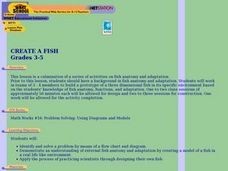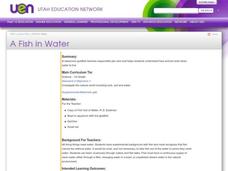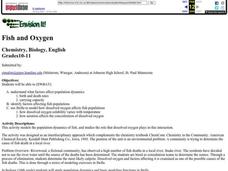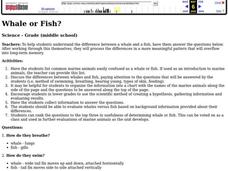Curated OER
Comparative Embryology Using Japanese Medaka Fish
Students conduct an experiment to control the breeding of Japanese Medaka fish. They collect the fertilized eggs and view and record the fish's embryological development daily to compare the stages to human development.
Curated OER
Phil's Fish Shop
Students role play the role of new employees in a pet shop. They offer advice to customers and answer their questions about pets. Using the internet, they identify the steps in establishing a new fish aquarium and summarize the...
Curated OER
Fish Tunes
Students use their musical talent to create a song for the class fishtank. In a group, they compose two or three songs about their own tropical fish in which they can use any rhythm and musical instruments they choose. They perform...
Curated OER
When Fish Die
Learners discuss what to do with a very sick fish and help it to die without much pain. As a class, they answer questions about the fish and if they believe it is suffering or not. Using their own experiences, they share how they dealt...
Curated OER
A Fish Talks about Life with a Famous Man or Woman
Students select a famous person they are interested in gathering information about. Using that person and how they made history, they write a story pretending to be a fish in their aquarium. They answer questions given to them by their...
Curated OER
Fish Around the World
Students use a globe to answer questions such as which continent they live in and the country in which they live. They identify at least two bodies of water near their state and two foreign countries. In groups, they complete a...
Curated OER
Aquarium Bill of Rights
Learners review the Bill of Rights on Aquademics and list the rights that are guaranteed to United States citizens. In groups, they role play the role of important leaders whose rules would make a difference for the lives of fish in...
Curated OER
Japanese Fish Printing
Students examine the characteristics of Japanese fish printing. Using a fresh or frozen fish, they create their own unique fish print. They paint the fish in the colors they chose and place it on a piece of colored paper. They...
Curated OER
An Imaginary Tropical Fish
Students examine the fins and mouths of different types of fish to discover what it eats and where it lives. They discuss that the types of fish are different because they adapted to different lifestyles. They develop a lifestyle of an...
Curated OER
Fish Aquarium
Students make an aquarium for fish out of construction paper. They count the number of fish in their aquarium, as well as, recognize the colors of their fish.
Curated OER
CREATE A FISH
Students watch a video that helps shows them how a diagram, flow chart, or blueprint can help them create a 3-d fish with the correct anatomy to live in a realistic environment.
Curated OER
Fish Workings
Students observe, hypothesize, and draw conclusions regarding fish. They examine their anatomy, and how they function in their environment.
Curated OER
A Fish in Water
First graders, with a goldfish as a class pet, practice the proper way to care for a pet and have responsibilities when it comes to taking care of the fish. As a class, the teacher reads the book "Fish Out of Water".
Curated OER
One, Two Jumping Fish
Students watch video segments of counting fish. They participate in counting fish in an activity.
Curated OER
Something Fishy
Students identify and discuss the adaptive characteristics and behaviors of fish. They view slides of fish, and design and create a model of a fish of the future, listing the ways their fish adapt to survive.
Curated OER
String of Fish
Fourth graders research a Florida fish to determine its length. They display this information on two index cards, which are cut to the shape of the head and the tail and attached to a string that they measure and cut to the correct...
Curated OER
Something Fishy
Students synthesize what they have learned about the anatomy of fish and their methods of adapting to survive.
Curated OER
Fish and Oxygen
Students explore what factors affect population dynamics, identify factors affecting fish populations, and use Stella to model how dissolved oxygen affects fish populations.
Curated OER
Investigation 11 - Utah Fish
Fourth graders examine a particular Utah fish and then create a poster that shares what they learned. They access websites imbedded in this plan to aide them in their research.
Curated OER
Zapping Fish
Middle schoolers explore whether fish get electrocuted when the lightning strikes a lake.
Curated OER
Go Fish:
Third graders imagine that they are asked to determine the number of fish in a nearby pond. To count the fish one by one, they could remove the fish from the pond and stack them to one side, or mark each fish so they would not count them...
Curated OER
Swim Like a Whale or Fish?
Students recognize the difference between whales and fish by categorizing them according to their method of swimming. They synthesize this information by simulating the swimming patterns of whales and fish and comparing it to their own.
Curated OER
Whale or Fish?
Students explain the difference between a whale and a fish. After working through this themselves, they process the differences in a more meaningful pattern that overflows into long-term memory.
























